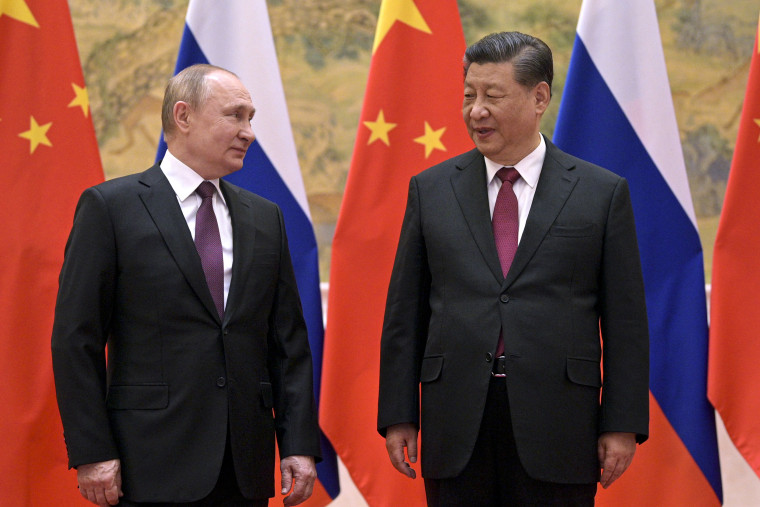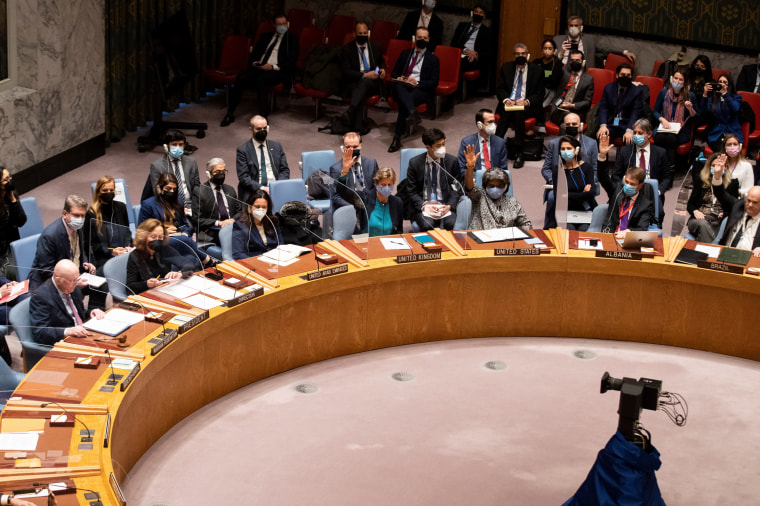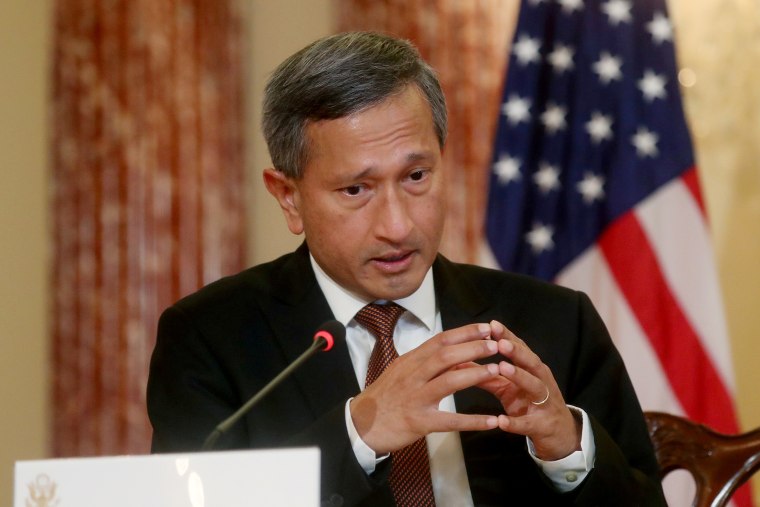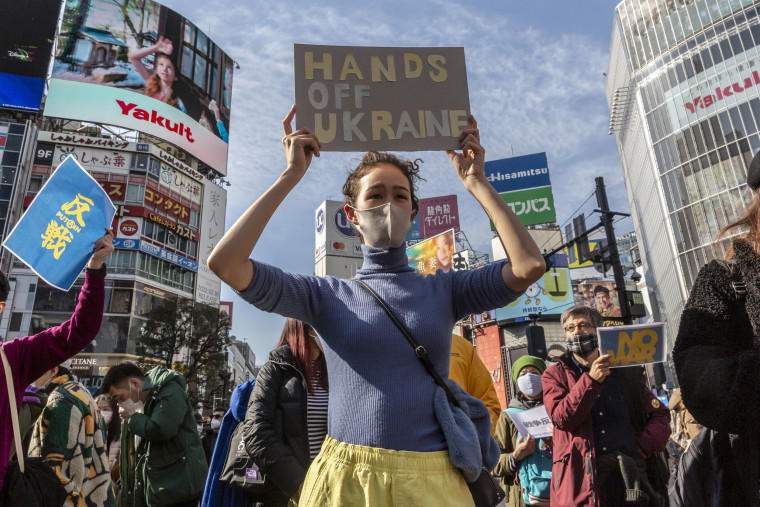HONG KONG — Countries in Asia are treading cautiously in their response to the crisis in Ukraine, as they try to triangulate complex relations with the United States, Russia and China, experts say.
“The important thing to remember about the Ukraine crisis and this Russian invasion is that it’s not simply a Western crisis,” said Manjari Chatterjee Miller, senior fellow for India, Pakistan and South Asia at the Council on Foreign Relations. “It’s very much also an Asian crisis.”
Many Asian governments are formulating their responses with an eye on China, which has growing ties with Russia and is the only major government to refrain from condemning its actions in Ukraine.
“Smaller Asian countries are very worried about Chinese encroachment,” Miller said. “What these countries are worried about is essentially pushing Russia closer to China.”
As Asian geopolitics have shifted in recent years, many governments have adopted what experts call a “hedging” policy, relying on the U.S., Russia and China to keep each other’s power in check. The Ukraine crisis threatens to upset that balance, Miller said.
“What smaller Asian countries don’t want is to have two blocs: the U.S. and Western countries as well as Japan and Korea in one bloc; and Russia, and perhaps even China, in one bloc, which would then really have echoes of the Cold War,” she said.

Japan and South Korea, two of Washington’s biggest allies in Asia, have both said they will join in international economic sanctions against Russia, including the exclusion of some Russian banks from the SWIFT international payment system. On Monday, Japanese Prime Minister Fumio Kishida said he would also restrict transactions with the Russian central bank.
Taiwan, a self-ruling democracy claimed by China that relies on the U.S. for support, is also joining sanctions, including the SWIFT ban. But experts say these sanctions are mostly symbolic, with Japan, South Korea and Taiwan each accounting for less than 5 percent of Russia’s imports as of 2019, according to Santander Trade.
“I think the U.S. probably appreciates some of the moves, even if symbolic,” said Chong Ja Ian, an associate professor of political science at the National University of Singapore.
Other governments in Asia have hesitated even on symbolic actions.
Download the NBC News app for breaking news and politics
Among the most notable is India, which like China abstained from voting on a U.N. Security Council resolution calling on Russia to withdraw its forces from Ukraine.
Miller said India is in a “very, very uncomfortable position,” as it has “strategic partnerships” with both the U.S. and Russia, one of its largest arms suppliers.
India has been growing closer to the U.S. in a number of areas, developing “a relationship that would have been unthinkable 20 years ago,” she said. “But at the same time, it continues to depend on Russia for not just military hardware, but for spare parts and technology to upgrade and maintain what it has.”

Even as India strengthens ties with the U.S., its neighbor Pakistan is moving closer to Russia. Prime Minister Imran Khan was heavily criticized last week for continuing with his scheduled trip to Moscow as Russia began its invasion of Ukraine. Like India, Pakistan has called for dialogue and the cessation of violence, without assigning blame.
The Ukraine crisis has also divided the 10 members of the Association of Southeast Nations (ASEAN), some of which have close relations with Russia or rely on it for weapons. In a statement dated Saturday, ASEAN foreign ministers said they were “deeply concerned” over the situation in Ukraine and that there was “still room for a peaceful dialogue.” But they did not condemn Russia, or even mention it by name.
Military leaders in Myanmar, an ASEAN member, have expressed support for Russia’s actions, saying they demonstrated Moscow’s position as a “world power,” The Associated Press reported. Myanmar’s government-in-exile, which was ousted by the military in a coup last year, has condemned the attack on Ukraine.
Singapore, another ASEAN member, said Monday that it would impose its own sanctions against Russia after the Security Council resolution failed.
Addressing Parliament, Foreign Minister Vivian Balakrishnan said that while Singapore values its “good relations with Russia and the Russian people,” violations of sovereignty and territorial integrity are an “existential issue” for a country like Singapore, a tiny city-state of about 5 million people.
If Singapore failed to stand up for Ukraine, “our own right to exist and prosper as a nation may similarly be called into question one day,” he said.

Bilahari Kausikan, a retired Singaporean diplomat, said in a Facebook post that it was “almost unprecedented” for the country to impose unilateral sanctions.
“This action should not be seen as anti-Russian but as support for international law,” he said.
Aside from Singapore, the only ASEAN members to condemn Russia’s actions as of Tuesday are Indonesia and the Philippines, which like Japan and South Korea is a U.S. treaty ally.
Experts say even Japan and South Korea face complications in confronting Russia. Japan is wary of pushing sanctions too far, as it might provoke Moscow into expanding its military presence on islands that both countries claim as their territory, said Sebastien Fung, a lecturer specializing in Japanese foreign policy at the University of Hong Kong.
Chong said South Korea views Russia, whose relations with North Korea have improved under President Vladimir Putin, as important in efforts to negotiate with Pyongyang on its weapons programs.
The urgency of the North Korea issue was underlined on Sunday when it launched what appeared to be a ballistic missile, its eighth weapons test this year.
“North Korea is not going to do anyone the favor of staying quiet while the world deals with Russia’s aggression against Ukraine,” said Leif-Eric Easley, associate professor of international studies at Ewha Womans University in Seoul, South Korea.
